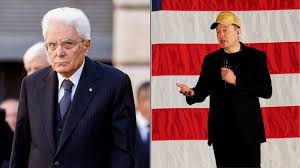Italy: President reaffirms sovereignty after Musk criticises judges on migrant ruling

Rome: Italy’s President Sergio Mattarella on Wednesday responded sharply to Elon Musk’s controversial comments on Italian judges, restating the country’s full sovereignty and its capacity of “looking after itself.”
Musk, the world’s richest man, set to play a major role in the new US administration led by Donald Trump, on Tuesday harshly criticized a Rome court for having blocked the detention of a second batch of migrants in an Albanian detention center.
“These judges need to go,” Musk commented on X, the social network he owns.
Musk’s words split Italian politics, attracting favors from representatives of the far-right government of Giorgia Meloni, while being slammed as an “unacceptable interference” by the center-left opposition.
“Italy is a great democratic country and I must reiterate that it knows how to look after itself in compliance with its Constitution,” Mattarella said in a short statement.
“Anyone, particularly if, as announced, about to take on an important government role in a friendly and allied country, must respect its sovereignty and cannot take on the task of giving it prescriptions,” he added, without citing Musk by name.
Italy’s national magistrates’ association had already expressed its “stupefaction” at Musk’s intervention. “It is no longer the independence of the judiciary that is in question here, but the sovereignty of the Italian state,” said the association’s vice-president Alessandra Maddalena.
A Rome court on Monday once again suspended the detention of migrants that were sent by Italy to Albania for processing.
The ruling represented a new setback for a contentious migration scheme championed by Meloni.
Under the five-year deal, Albania would allow Italy to run two processing centers on its territory with the capacity to screen up to 3,000 migrants a month while Rome decides if they qualify for asylum or should be returned to their home countries.
Human rights groups have criticized the agreement as a dangerous precedent and questioned whether it complies with international laws.





